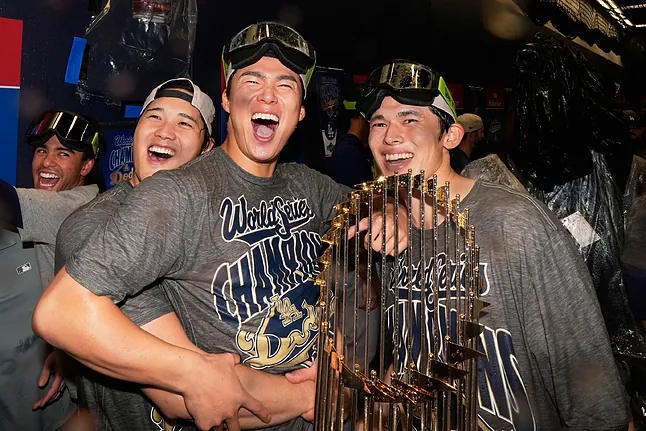When the legendary David Ortiz is asked these days to explain what he thinks of Sohei Ohtani, two-time league MVP and already for many the greatest baseball player of all time, Big Papi's eyes light up. He says he has never seen anything like it, that he is "a unicorn, a beast," an "extraterrestrial," something unprecedented. A "tremendous guy, humble, the best hitter on the planet and among the top 10 most dominant pitchers." Martinez knows what he's talking about. He has played against the best in history and has earned a place not only among them but also among TV commentators.
Big Papi, like Pedro Martinez or Vladimir Guerrero (father and son), represent better than anyone all those generations of Dominican, Cuban, and Venezuelan players who have transformed the major leagues. Now in sports like basketball, it is normal for foreigners, like Nikola Jokic, Luka Doncic, or Victor Wembanyama, to compete on equal terms with local stars and even surpass them. In baseball, the revolution came much earlier. But what Ohtani does is exceptional, unique.
He hits like no one else, pitches like the chosen ones, runs like the fastest, steals bases like the craftiest. All in one. "Ohtani has the ability to control both positions. For 700 million, the Dodgers signed two players in one. But what he does, only an Asian can do it, because of their discipline. They cannot be that good without that discipline," says Big Papi. "This man's discipline is everything. The players' routines are long and complicated, I didn't have time for that and I was just a position player. What he does... where he comes from, he arrives programmed," he insists.
The Los Angeles Dodgers won the World Series last Saturday for the second consecutive time, something that no one had achieved since the era of the Yankees at the end of the last century. Ohtani broke records, did things that no one had done before, but the MVP of the finals was not him, but his compatriot Yoshinobu Yamamoto, who took the pitcher's mound in the ninth inning of the last game, the loneliest place on the planet. And he did it after having pitched 96 times the night before. His arm had to be destroyed, the ligaments at their limit, but Yamamoto, even far from his best moment, managed to close the game.
Alongside them, the trophy was celebrated by the very young Roki Sasaki, the next generation. The first time that three Japanese players have won an MLB title, but probably not the last. A sport always associated with the US, the Caribbean, now sees the emergence of Asians. When asked, experts say that the progressive Japanization of the game is logical. That the passion in Japan is extraordinary. That there is a very competitive league, passion, tens of millions of fans, and children with gloves in their homes, but above all, they have "a culture of discipline and dedication."
There are studies that have analyzed how there can be so many good Japanese pitchers. Exploring their biomechanical differences, how they use their legs and hips more than their elbows, allowing them to recover faster between games. Or how their physical work, more focused on elasticity, mobility, and control of the whole body (Yamamoto's videos doing bridge push-ups are spectacular) than on weights. Nothing matters more in pitchers than longevity and recovery, given their exposure that often leads to surgery.
Up to 2 billion dollars
Players, from the field, actually say that it's all a matter of mindset. Of discipline. Of being able to master the impossible routines of a chaotic game. They focus, cling to the plan, and do not let distractions, nerves, get in the way. Ohtani has his whole country behind him, added to the pressure of professional sports, or personal scandals, after his friend and interpreter was convicted of stealing millions of dollars from him by taking advantage of his good faith. And none of that, not even injuries, has disturbed him.
It has been 30 years since Hideo Nomo first arrived in the United States, precisely with the Dodgers. And it has been 24 years since the emergence of Ichiro Suzuki, who was the rookie of the year and will be the first Japanese in the Hall of Fame.
In the US professional league, there are currently 12 players born in Japan. Not even counting Yamamoto and Ohtani, stars like Seiya Suzuki, Kodai Senga, Tomoyuki Sugano, Yusei Kikuchi, and Kenta Maeda have contracts that combined approach 2 billion dollars. And the talent pool seems inexhaustible. Even the manager of the Dodgers, Dave Roberts, was born in Okinawa, as his father was a military man there.
The virtues of the Japanese school
Game scholars say that one of the great differences between Americans in general, from the North or the Caribbean, and Asians is patience. And this is the result of that mentioned discipline. American baseball is much more physical, with many more games, and more aggressive. Batters try to hit all the balls out of the stadium, while the Japanese school of thought advocates for wearing out and frustrating the pitcher. Waiting as long as necessary.
Japan has been waiting for this moment for years. They have been the great dominators of international baseball in recent decades, including the Olympics. It is the national sport, and no one has invested more than them, outside of the US. Japanese clubs have the same resources as American ones, and they can capture and develop talent in a more systematic way. Baseball is a sport of stellar moments, and a foreign country is monopolizing them.
